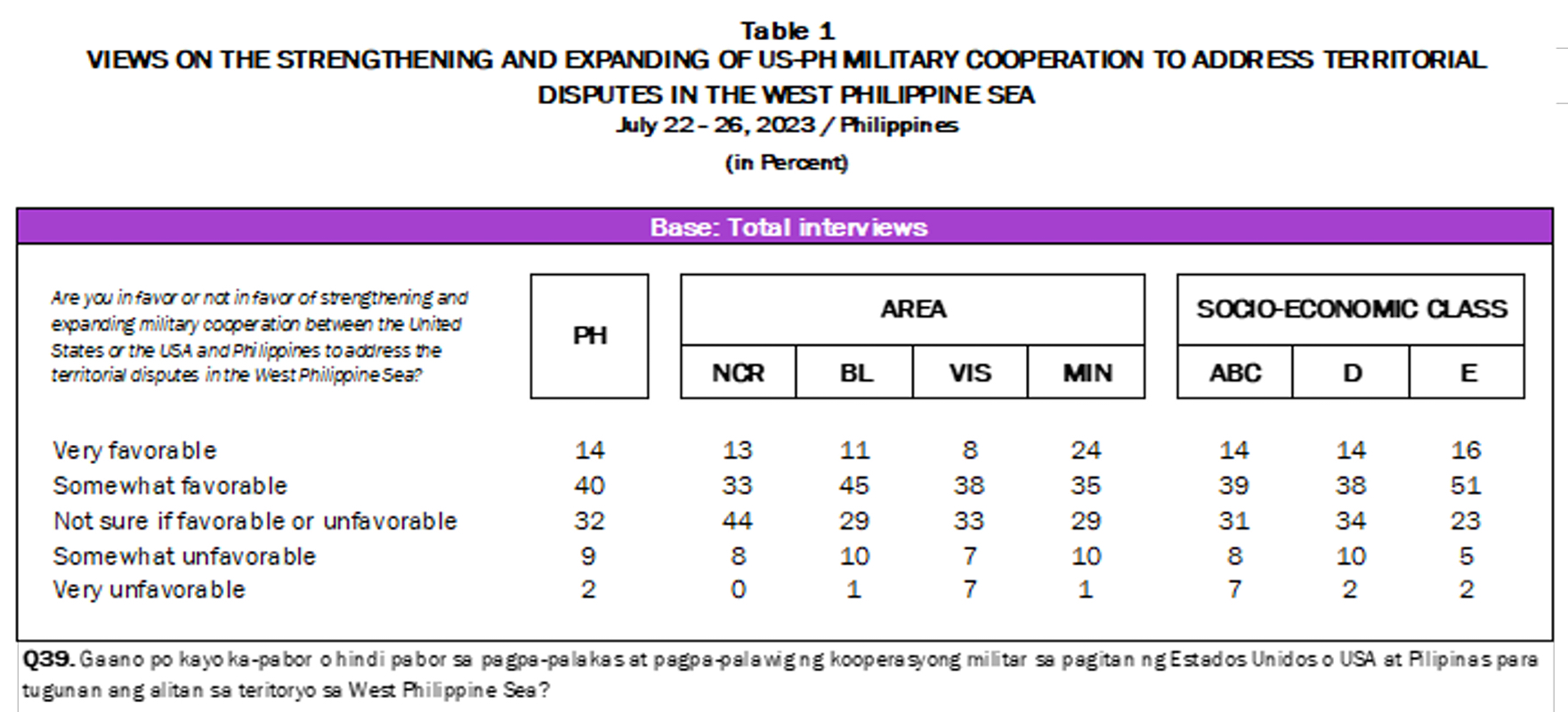OCTA: 54% of Filipinos support bolstering US-PH military cooperation to resolve WPS territorial disputes
At A Glance
- Fifty-four percent of Filipinos were in favor and 11 percent were not in favor of strengthening and expanding the US-Philippines military cooperation to address the West Philippine Sea territorial disputes.
- Majority of respondents in Luzon and Mindanao (56 and 59 percent, respectively) support bolstering and extending US-Philippines military cooperation.
- Fifty-eight percent of Filipinos were also found to be in favor of strengthening and expanding military cooperation between the US and the Philippines in the face of numerous external threats.

An independent survey conducted by the OCTA Research bared that most Filipino adults are in favor of strengthening and expanding military cooperation between the United States (US) and the Philippines to address the territorial disputes in the West Philippine Sea (WPS).
The survey results released on Thursday, Aug. 17 found that 54 percent were in favor and 11 percent were not in favor of strengthening and expanding the US-Philippines military cooperation.
Meanwhile, 32 percent were undecided on the matter.
Support for stronger US-PH cooperation highest in Luzon, Mindanao
According to OCTA, majority of respondents in Luzon and Mindanao (56 and 59 percent, respectively) support bolstering and extending US-Philippines military cooperation to resolve the WPS conflict.
In contrast, 46 percent of respondents in Visayas and the National Capital Region (NCR) support it.
“In terms of those who are undecided or ambivalent to the strengthening of US-PH military cooperation to address the WPS disputes, NCR has the highest percentage at 44 percent followed by Visayas at 33 percent. Balance Luzon and Mindanao have similar percentages of undecided or ambivalent at 29 percent,” OCTA said.
While Balance Luzon (11 percent), NCR (8 percent), and Mindanao (11 percent) have statistically similar levels of opposition to the policy—roughly one in 10 adult Filipinos living in those regions—opposition to enhancing and expanding US-Philippines military cooperation is highest in Visayas at 14 percent, OCTA pointed out.
Across socio-economic classes, class E has the highest percentage of those who are in favor of the strengthening and expansion of US-Philippines military cooperation at 67 percent.
The percentage of adult Filipinos in Classes ABC and D who are favorable is statistically tied at 53 and 52 percent, respectively.
58% support expanding military cooperation to address external threats to PH in general
Majority of Filipino adults, or 58 percent, were found to be in favor of strengthening and expanding military cooperation between the United States and the Philippines in the face of numerous external threats, OCTA said during the same survey period.
Only 12 percent are not favorable, while 28 percent are undecided.
“Across major areas, support for strengthening and expanding US-PH military cooperation is almost two-thirds majority in both Balance Luzon and Mindanao at 63 and 64 percent, respectively,” OCTA said.
“Meanwhile, only 48 percent are favorable in NCR. Visayas has the lowest percentage supporting the strengthening of US-PH military cooperation at only 44 percent,” it added.
NCR has the highest percentage (43 percent) of respondents who are unsure or ambivalent about the idea of enhancing US-Philippines military cooperation, followed by Visayas with 31 percent.
Balance Luzon and Mindanao are statistically tied at 24 and 27 percent, respectively.
OCTA also pointed out that opposition to the strengthening of US-Philippines military cooperation is strongest in Visayas at 18 percent.
Meanwhile, Balance Luzon (11 percent), NCR (9 percent), and Mindanao (9 percent) have statistically similar levels of opposition to the policy at around one in 10 adult Filipinos residing in those areas.
Across socio-economic classes, class E has the highest percentage of those who are in favor of strengthening US-Philippines military cooperation at 70 percent.
Class ABC and D are statistically tied at 52 and 56 percent, respectively.
OCTA’s “Tugon ng Masa” survey was conducted from July 22 to 26, 2023, with 1,200 adult respondents nationwide.